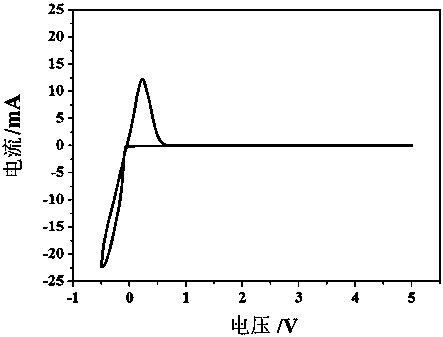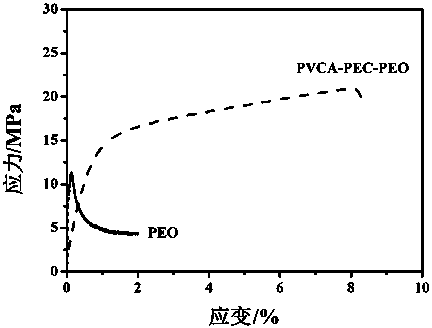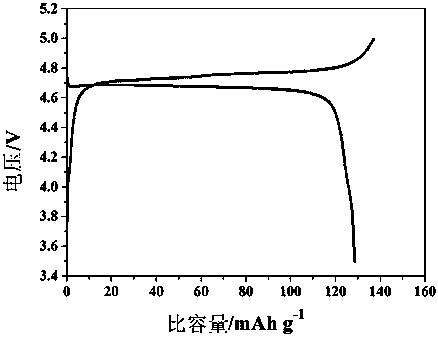A composite solid-state electrolyte with a multi-level structure for a wide potential window for lithium batteries
A solid electrolyte, electrolyte technology, applied in secondary batteries, circuits, electrical components, etc., can solve problems such as affecting battery performance, low ionic conductivity, and inhibiting application of interface compatibility.
- Summary
- Abstract
- Description
- Claims
- Application Information
AI Technical Summary
Problems solved by technology
Method used
Image
Examples
Embodiment 1
[0044] PVCA-PPC-PEO three-layer composite solid electrolyte
[0045] Dissolve PVCA and LiDFOB with a molecular weight of 150,000 in DMF, the mass ratio of PVCA and LiDFOB is 5:1, and the concentration of PVCA in DMF is 2 g mL -1 ; Dissolve PPC and LiDFOB with a molecular weight of 300,000 in acetonitrile, the mass ratio of PPC and LiDFOB is 5:1, and the concentration of PPC in acetonitrile is 4 g mL -1 ; Dissolve PEO and LiDFOB with a molecular weight of 5 million in acetonitrile, the mass ratio of PEO and LiDFOB is 5:1, and the concentration of PEO in acetonitrile is 2 g mL -1 .
[0046] Scrape the PVCA solution on the glass plate with a 75 μm spatula; 60 o C dry for 6 hours, scrape the PPC solution on the PVCA film with a 400 μm spatula; 60 o C dry for 6 hours, scrape the PEO solution on the PPC film with a 250 μm spatula; place the electrolyte at 60 o C vacuum oven for 12 hours to obtain a PVCA-PPC-PEO three-layer composite polymer electrolyte with a thickness of 200 μm.
[0047] T...
Embodiment 2
[0049] PVCA-PEC-PEO three-layer composite solid electrolyte
[0050] Dissolve PVCA and LiTFSI with a molecular weight of 150,000 in DMF, the mass ratio of PVCA and LiTFSI is 5:1, and the concentration of PVCA in DMF is 2 g mL -1 ; Dissolve PEC and LiTFSI with a molecular weight of 300,000 in acetonitrile, the mass ratio of PEC and LiTFSI is 2:1, and the concentration of PEC in acetonitrile is 4 g mL -1 ; Dissolve PEO and LiTFSI with a molecular weight of 1 million in acetonitrile, the mass ratio of PEO and LiTFSI is 5:1, and the concentration of PEO in acetonitrile is 2 g mL -1 .
[0051] Scrape the PVCA solution on the glass plate with a 50 μm spatula; 60 o C dry for 6 hours, scrape the PEC solution on the PVCA film with a 600 μm spatula; 60 o C dry for 6 hours, scrape the PEO solution on the PEC membrane with a 400 μm spatula; place the electrolyte at 60 o C vacuum oven for 12 hours to obtain a PVCA-PEC-PEO three-layer composite polymer electrolyte with a thickness of 300 μm.
[005...
Embodiment 3
[0054] PMMA-PPC-PPO three-layer composite solid electrolyte
[0055] Dissolve PMMA and LiTFSI with a molecular weight of 300,000 in DMF, the mass ratio of PMMA and LiTFSI is 5:1, and the concentration of base PMMA in DMF is 0.5 g mL -1 ; Dissolve PPC and LiTFSI with a molecular weight of 300,000 in acetonitrile, the mass ratio of PPC and LiTFSI is 5:1, and the concentration of PPC in acetonitrile is 4 g mL -1 ; Dissolve PPO and LiTFSI with a molecular weight of 300,000 in acetonitrile, the mass ratio of PPO and LiTFSI is 8:1, and the concentration of PPO in acetonitrile is 1 g mL -1 .
[0056] Scrape the PMMA solution on the glass plate with a 20 μm spatula; 60 o C dry for 6 hours, scrape the PPC solution on the PMMA film with a 100 μm spatula; 60 o C dry for 6 hours, scrape the PPO solution on the PPC film with a 100 μm spatula; place the electrolyte at 60 o C vacuum oven for 12 hours to obtain a PMMA-PPC-PPO three-layer composite polymer electrolyte with a thickness of 80 μm.
[005...
PUM
| Property | Measurement | Unit |
|---|---|---|
| thickness | aaaaa | aaaaa |
Abstract
Description
Claims
Application Information
 Login to View More
Login to View More - R&D
- Intellectual Property
- Life Sciences
- Materials
- Tech Scout
- Unparalleled Data Quality
- Higher Quality Content
- 60% Fewer Hallucinations
Browse by: Latest US Patents, China's latest patents, Technical Efficacy Thesaurus, Application Domain, Technology Topic, Popular Technical Reports.
© 2025 PatSnap. All rights reserved.Legal|Privacy policy|Modern Slavery Act Transparency Statement|Sitemap|About US| Contact US: help@patsnap.com



